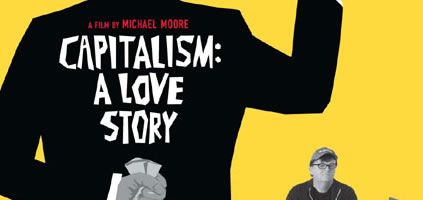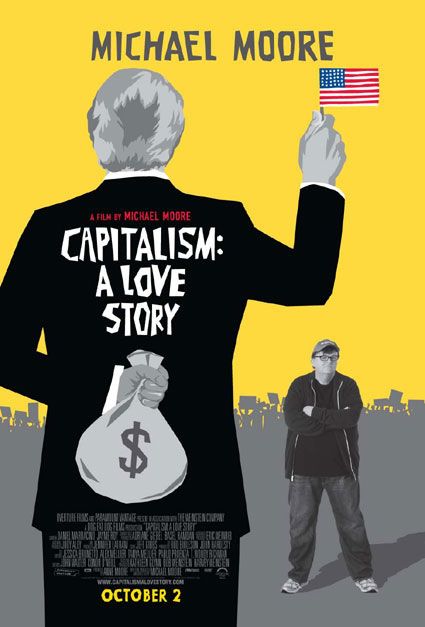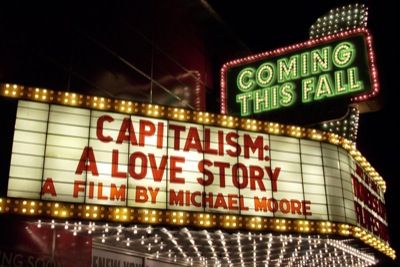Michael Moore's Capitalism: A Love Story could not be more timely. With the country facing the worst recession it has seen in many people's lifetimes, a general sense of negativity towards banks and Wall Street, and the highest unemployment rates many have ever seen, Capitalism should be exactly the sort of thing that we'd like to see Moore doing nowadays. So, why was this critic so underwhelmed by the film? Find out after the jump, my precious snowflakes.
Yes, Michael Moore's C:ALS couldn't be more of-the-moment if it tried, and, sure, it's probably one of Moore's best films. We'll get to what I did and didn't like about the film in a second, but because this is a Michael Moore film we're talking about here, it's probably a good idea to discuss...politics. Yes, the other, dirtier "P-word".
Have an opinion on a Michael Moore film, and right off the bat you've taken a side. At least, that seems to be par for the Michael Moore course. Say that you loved Fahrenheit 9/11, and people will make some assumptions about your personal politics. Say that you hated Bowling for Columbine, and they'll make some more. Because Michael Moore is such a polarizing figure, and because his subjects have always been-- in the end-- political issues, the general consensus seems to be that "liking" a Michael Moore film is tantamount to being on his side.
Folks, let's try and not do that this time.
I'm a fan of pretty much everything Moore's done in the past. I even enjoyed his short-lived TV show. Sicko I wasn't crazy about, but that was because I felt the film seemed lethargic and half-hearted in its attempts to rile up the audience about the topic at hand (which, in case you've been in a coma, was the health-care industry). With C:ALS, I wasn't blown away by Moore's take on Wall Street and the greedy bastards who run it. In fact, I was kind of bored with it. Oh, let's just say it: I didn't really care for it.
Now, instead of firing off a series of angry comments denouncing me as just being a Michael Moore hater, just remain calm. I still like Michael Moore-- though I understand that, like Bill O'Reilly, he's really nothing more than a troublemaking fundamentalist with a twist of propagandist thrown in for good measure-- and I didn't disagree with anything he had to say with C:ALS. I just wasn't very entertained watching it.
There's an argument to be made for the idea that Moore's not trying to entertain us with his films, that he's trying to educate us. I don't buy that for a minute, but I suppose one could make that argument. I've been entertained by all of Moore's other films, but with C:ALS, Moore does a few things differently, and I felt that all of them hampered the final product as a piece of entertainment. As far as educating the average filmgoer, I'd say Moore was successful: there were many things that I simply didn't understand about the economic crisis the country's in before seeing this film, but now I do.
But, again, I don't think Moore's films are supposed to be all about educating the viewer. They should entertain, and C:ALS didn't. For one thing, Moore's indignation reaches a fever pitch that basically amounts to him calling for a revolution. In the closing moments of the film, as Moore wraps a roll of CAUTION tape around the NYSE, his voiceover essentially demands that the viewer rise up, overthrow the bankers of the world, and take what's rightfully theirs back.
Um, OK. We'll get right on that.
Moore's central argument here is that capitalism is bad, banks aren't to be trusted, and that we've let the madness go on for far too long. It should be noted that Obama is definitely a part of this film, and that he's presented as...well, if he'd rode a white horse on-screen and shot a dude in a black hat, it wouldn't have been out of place. I don't have anything against Obama, but presenting him as Moore has here-- as nearly infallible-- seems a bit disingenuous on the heels of the many criticisms that have been leveled his way following the way he's handled the economic crisis (or not handled it, depending on who you talk to). Where's the anger for Obama's missteps?
All of Moore's films have had a certain level of indignation and fury-- just look at Fahrenheit 9/11-- but (and this is just my opinion, remember that) C:ALS actively curbs some of the humor and snarkiness of Moore's other works and trades them in for flat-out anger. It's appropriate to be this angry, to be sure, but I found the idea of a revolution following any showing of C:ALS by the audience witnessing it to be...well, a bit much.
Moore's other major change in style comes with his notable absence from the proceedings. The director doesn't show up onscreen until 20-minutes or so after the film's started, and he maintains that distance from the audience for the majority of the film. This is something that he tried in Sicko, as well, and I think it's a decision that was made with the best intentions. Clearly, Moore's reacting to the critics that blasted him for making himself the star of the show so many times before. But the thing is, Michael Moore fans like Michael Moore. They want to see Moore interacting with his victims-- and his supporters-- because he's entertaining. This new approach, with Moore as educator versus Moore as entertainer...well, it's just not working for me.
If you've been a fan of Moore's work in the past, there's no reason why you shouldn't see Capitalism: A Love Story. It's well made, it does a great job of educating those that aren't too good with fancy-pants, complicated economy-talk, and it certainly drives home a very specific message. And, as I said before, it's probably one of Moore's best films. But if you're looking for a piece of muckraking entertainment, you'd do better to rewatch Bowling for Columbine or Roger and Me.
The disc-- as all of Moore's films are-- is packed with extras. There's a featurette based around banks and house-flippers in Flint, Michigan (and, by the way, can we take a break from all the Flint, Michigan talk? Let's pick another city to use as our go-to example of things going wrong. My pick: Detroit), an interview with Pulitzer-prize winning journalist Chris Hedges on capitalism, a segment on Communist cab drivers in Wisconsin, another called "The Rich Don't Go to Heaven", and many more. Basically, there's a little side-feature for every major set-piece in the film, either a further discussion of the topic at hand or an interview with someone involved. It's all as impressively-stacked as Moore's film usually are on DVD.
Whether or not you'll like Capitalism: A Love Story shouldn't have anything to do with how you feel about Michael Moore. If you're a completist and a fan, see the film. If you're feeling a little left out of the conversation any time the economic crisis comes up because you don't understand what the hell happened, see the film. Otherwise, Moore's made more entertaining movies than this one.





